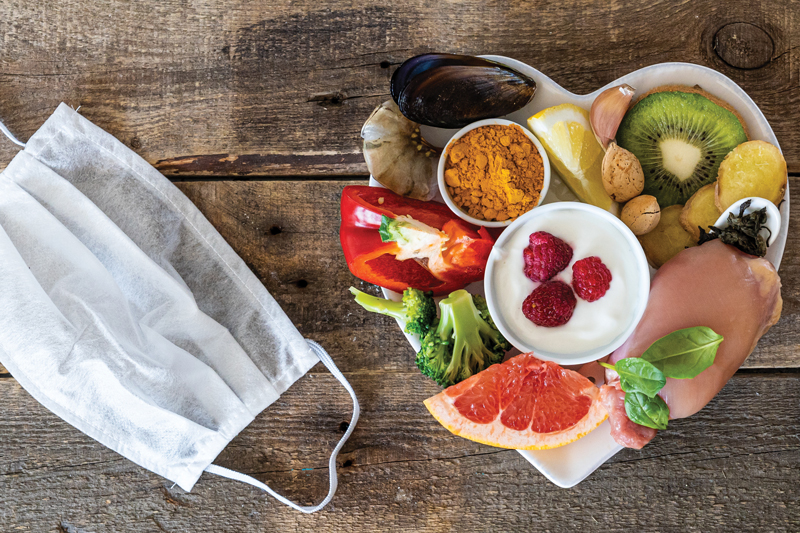With the state of uncertainty that still lingers in the air surrounding the Covid-19 pandemic, it is a good time to have a better handle on our health. In absence of a treatment, it is wise to make use of alternative methods to help control acquiring the infection and its severity. It is further supported by the Harvard School of Public Health to depend on good quality supplements to help reduce the risk of infection. Here are a few of the supplements that are supported by peer-reviewed studies to be helpful for supporting the immune system.
Vitamin D3
Vitamin D3 deficiency is common in many health conditions, including chronic illnesses, many types of cancer, autoimmune diseases, HIV, coagulopathy, advanced age and morbidity. In fact, one study showed that 84% of ICU patients with Covid-19 had insufficient vitamin D levels. Vitamin D helps turn on infection fighting cells, such as monocytes macrophages and dendritic cells, via vitamin D receptors (VDR) located on the cells. Vitamin D also induces antimicrobial peptides, defensins and cathelicidins, which decrease the rate of viral replication, increase anti-inflammatory cytokines, and reduce concentrations of pro-inflammatory cytokines, the same that have been associated with injuring the ringing of the lungs.
Vitamin C
As you know, clinical trials are being conducted on the use of IV vitamin C for supportive care for Covid-19 patients, where vitamin C is being shown to decrease the duration of stay in ICU and the need for mechanical ventilation. There are over 60,000 studies on Vitamin C in PubMed, and its antiviral actions were actually discovered more than 80 years ago when scientists were researching poliomyelits.
Zinc
Zinc has been shown to decrease the rate of acute respiratory infections, shorten the duration of flu-like symptoms and improve recovery time. Its antivi- ral effects are due to its ability to inhibit RNA-dependent RNA polymerases and other proteins that are essential for viral replication.
Monolaurin
Monolaurin is derived from Lauric acid, which is found in coconut oil. It has a broad spectrum of activity where studies have shown monolaurin to be effective against staph infections, E. Coli, Bacillus, Candida, and Gram negative bacteria, such as H.pylori. It has shown to have antiviral properties against influenza, pneumovirus, EBV, HSV and HIV. When it comes to viral infections, it binds to the viral envelope, causing it to disintegrate, inhibits late stage viral maturation, and prevents binding of the virus to the host cell.
Quercetin
Quercetin is a type of polyphenol known to have antioxidant and anti-inflammatory effects. The International Journal of Antimicrobial Agents suggests that Quercetin has anti-coronavirus effects by its ability to modulate unfolded protein response, which is a pathway that plays a role in the viral life cycle.
Glutathione
People who suffer from pulmonary disease, cardiovascular disease, immune disorders, neurodegenerative disorders, and chronic age-related diseases tend to have low levels of glutathione. There is extensive literature on the role of glutathione in immunity. It maintains the active states of vitamins C and E within cells. Its role in the host defense against intracellular pathogens is essential, where it is required to maintain an adequate interferon-gamma production by dendritic cells. Supplementing with glutathione alone is not enough to replenish deficiencies. Adding n-acetyl cysteine (NAC) and alpha- lipoic acid will help improve levels of glutathione.
This is just a handful of supplements that are supported by studies to be beneficial to the immune system and providing support during inflammatory responses to infections. There are many herbs that are being studied and researched in clinical trials for their role and potential benefits for being used in supportive care and treatments.
Consuming a diet that is nutrient-rich and high in antioxidants will help avoid becoming deficient in nutrients that are required for the immune system to function optimally. Keep in mind, during this stressful time we must also focus on our mental and spiritual well-being, for these are vital for the immune system. Try your best to get adequate amounts of sleep. Disruptive sleep is associated with increased sympathetic nervous system activity, a disruption in hypothalamic-pituitary-adrenal axis and pro-inflammatory responses; leading to an inability to fight infection, chronic illnesses, inflammation, mood disorders, and cognitive, memory and performance deficits. Getting regular exercise is shown to increase immune surveillance, increase the function of natural killer cells and CD8 T cells. Finally, address any anxiety and depression that you may be experiencing. New studies are claiming that over 70,000 people will die from the use of drugs, alcohol and suicide due to the Covid-19 pandemic. In spite of being quarantined many of us are readily available to help you in the comfort of your home and provide you with the support you need to get through this. Remember, alone we are strong, but together we are stronger.
Dr. Veena Verma-Dzik, ND, FIAMA is a board-certified Naturopathic Physician and certified medical acupuncturist who is highly experienced in treating acute and chronic health conditions. Dr. Verma received her doctorate from the University of Bridgeport College of Naturopathic Medicine and received further training and certification in Acupuncture and Lyme Disease. Her other specialties include women’s health, ADD/ADHD, GI conditions, mood imbalances, allergies, and fatigue. Each patient she sees receives personalized, individual care involving research-based treatments and therapies from her own clinical experience and success. The therapies she prescribes include herbal medicine, nutritional therapeutics, homeopathic medicine, low dose immunotherapy, and acupuncture. She works collaboratively with practitioners and therapists in her office at Insight Counseling in Ridgefield, CT. 203.431.9726
www.insightcounselingllc.com
